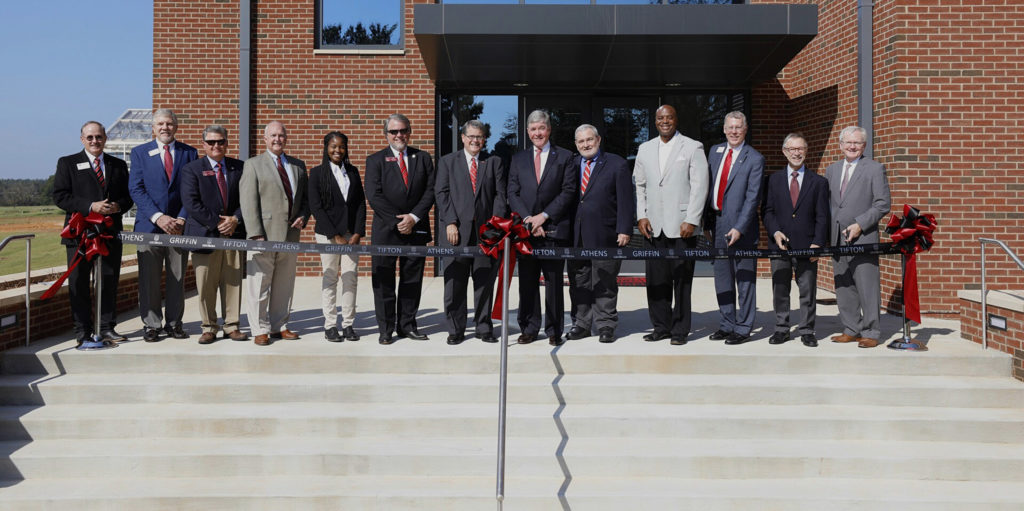University of Georgia, state and industry leaders cut the ribbon on Sept. 21 signifying the official openings of three new turfgrass research and education facilities on the Griffin, Tifton and Athens campuses.
The largest of the facilities is on the UGA Griffin campus, where the ceremony took place.
During the 2014 legislative session, Gov. Nathan Deal and the Georgia General Assembly appropriated funds for the statewide turfgrass facilities enhancement project.
“The University of Georgia remains very grateful to Gov. Deal, the General Assembly, the chancellor and the board of regents for their support of this important project,” said UGA President Jere W. Morehead. “The construction of new turfgrass research and education facilities will produce tremendous benefits not only for the university community but also for the agriculture industry, which is central to the state’s economy.”
UGA has 22 scientists whose primary responsibilities are related to turfgrass and another eight faculty members who have some involvement in turf-related projects. They support the turfgrass industry by conducting research, educating industry professionals and training students who will become future industry leaders.
These world-class facilities will … enable our turfgrass scientists to conduct cutting-edge research. — CAES Dean and Director Sam Pardue.
The new Turfgrass Research Building in Griffin sits close to the campus’s turfgrass research plots. The building houses seven turfgrass scientists, their staff, postdoctoral research associates, visiting scientists and graduate students. The facility includes modern laboratories, offices, conference and classroom space and attached greenhouses.
“Even though we have an excellent team, our buildings and greenhouses were old. Now we have state-of-the-art facilities, and the team can all be located in the same building,” said Paul Raymer, a Griffin-based UGA College of Agricultural and Environmental Sciences professor and turfgrass breeder. “Entomologists, plant pathologists, agronomists and support staff were scattered across campus in six or seven buildings. Now we can work together in a facility specifically designed to support our turfgrass research program.”
On the UGA campus in Tifton, old facilities have been replaced with new greenhouses and a headhouse facility to support UGA’s expanding warm-season turf breeding program. On the main UGA campus in Athens, scientists now have new greenhouses and a combination classroom and office complex to use for undergraduate teaching and research programs.
“These world-class facilities will enhance UGA undergraduate and graduate education programs, enable our turfgrass scientists to conduct cutting-edge research, and enable the College of Agricultural and Environmental Sciences to retain and recruit the top turfgrass scientists necessary to ensure a prosperous future for the vital Georgia turfgrass industry,” said CAES Dean and Director Sam Pardue.
UGA-bred turfgrasses covers lawns, championship golf courses, urban green spaces, and Major League and Little League playing fields in Georgia and across the nation and the world. Since 1990, the UGA Turf Team has generated close to $12 million in royalty income.
Turfgrass is a $7.8 billion industry in Georgia, accounting for 87,000 jobs.
For more information on UGA’s turfgrass programs, visit www.GeorgiaTurf.com.
